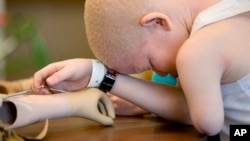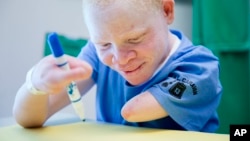The widespread killing of people with albinism for their body parts continues in some parts of Africa in the mistaken belief they bring good luck, wealth, and political success.
The horrendous trade flourishes because albino limbs and organs fetch a high price among people who believe in the power of black magic.
A panel of experts recently explored the root causes of attacks against persons with Albinism on the sidelines of the U.N. Human Rights Council meeting in Geneva.
As part of the discussion participants viewed a documentary opening with a shaft of sunlight breaking into the dark room where journalist Stephane Ebongue interviews a witch doctor about the shadowy trade in Albino body parts. Before the interview begins, the witch doctor demands a fee.
The documentary, “Jolibeau’s Travels,” was filmed in Douala, the economic center of Cameroon. Ebongue is a Cameroonian and an albino. He said he fled his country several years ago to escape the persecution of men who wanted his organs. He now lives and works in Turin, Italy.
He told VOA his interview with the witch doctor was a very unnerving experience for him.
“I remained quiet when I was doing the interview because I put forward my professional skills as a journalist. Because I went there, I did not act like an albino, but acted like a journalist. I put the questions. I had an aim. I wanted to know things about the phenomenon. I did not want to be emotional. I made a lot of effort not to go emotional, but it was difficult,” he recounted.
Ebongue said he did not feel the full force of the interview until it was over. He said he felt very bad and is not sure he would be able to repeat the experience.
‘A story that must be told’
The film’s director, Fabio Lepore, said he was inspired to produce the documentary after hearing Ebongue’s shocking tale of escape. He believes it is important to shed light on trafficking in albino body parts many of which are used for the preparation of potions by witch doctors and as talismans to be worn by those who believe in the power of black magic.
“Every year, hundreds of them disappear, sometimes in the silence. More than 20 years ago, it happened to Stephane’s brother, Maurice. I understood his story. It is a story that must be told, told and told again,” said Lepore.
Cindy Smith, director of the U.N. Interregional Crime and Justice Research Institute, was a panelist at the special session on the root causes of attacks against persons with albinism. She said the crimes and discrimination associated with albinism must be exposed.
“In many countries, people with albinism run the risk of being killed or bullied because of their appearance or disabilities. Many of them are illiterate because of the challenges they face to attend schools. Many are caught in prostitution rings or condemned to survive by begging,” Smith said.
Albinism is an inherited genetic condition characterized by the absence of melanin, which gives the skin, eyes and hair their very pale, almost translucent color. Attacks against albinos for their body parts and organs take place mainly in sub-Saharan African communities - in Tanzania, Malawi, and Burundi, among others.
Albino body parts fetch a high price. They can range from $2,000 for a limb to $75,000 for a full set of body parts.
No magical powers
Stephane Ebongue said the misperception that albino body parts have magical powers has fearful consequences.
“People think they can use those powers for themselves, that is for their own benefits - to win elections, as I said, to win a football match or to - when there is the eruption of a mountain to calm it down because people think sacrificing one or two or three Albinos, it helps to refine the mountain, which is erupting,” Ebongue said.
Superstitious beliefs are hard to uproot and the lives of people with albinism will likely continue to be at risk for the foreseeable future.
But the witch doctor in the documentary said the phenomenon is not primarily driven by belief. He assured journalist Ebongue that people do not like killing albinos. He said they just do it for the money.
Despite the doctor’s cynical assessment of why the horrific trade is flourishing, some promising steps in demystifying the myths surrounding albinism are taking place. There is also a growing awareness that for this crime to be stopped, perpetrators must be prosecuted and brought to justice.






